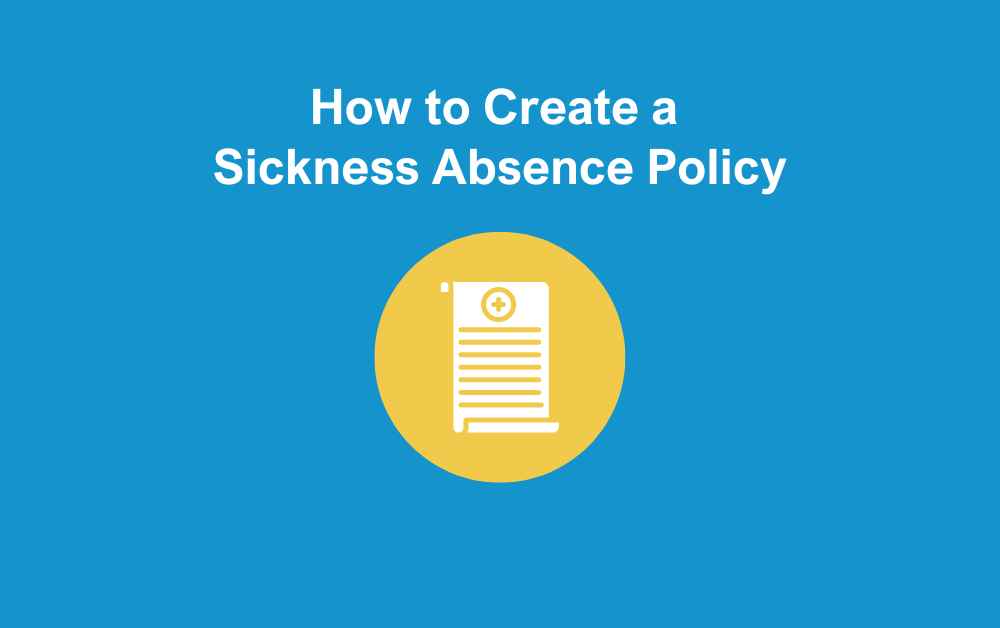A well-defined sickness absence policy is essential for any business. It ensures consistency in managing employee absences, provides clarity for employees, and helps minimise disruption to operations. Dealing with absences correctly and in an appropriate time-scale will help you maintain good productivity and reduce costs in the long run. Here’s a step-by-step guide on how to create an effective policy for your organisation.
What is a Sickness Absence Policy
A sickness absence policy is a formal document outlining an organisation’s approach to managing employee absences due to illness. It sets clear expectations on reporting procedures, required documentation such as fit notes, and the support available to employees. This document also details how sickness absence is monitored, including triggers for further action, such as absence reviews or occupational health referrals. It helps ensure consistency and fairness while balancing the needs of the business with employee well-being. Additionally, it may outline measures for return-to-work processes and adjustments to help employees reintegrate effectively after a period of illness.
Why should employers have a Sickness Absence Policy in place?
A sickness absence policy protects a business by providing a structured approach to managing employee absences, reducing the risk of disruption to operations and ensuring legal compliance. It helps prevent potential disputes by setting clear expectations on reporting procedures, required documentation, and return-to-work processes. By monitoring absence patterns, businesses can identify and address any underlying issues, such as excessive absenteeism or workplace health risks, before they escalate. This also ensures fairness and consistency, reducing the risk of discrimination claims and protecting the business from legal challenges. Additionally, by promoting a healthy and supportive work environment, it can improve employee engagement, reduce turnover, and enhance overall productivity.
What should be Included in a Sickness Absence Policy
A sickness absence policy should include the following key elements:
Purpose and Scope
An introduction outlining the policy’s aim, who it applies to, and its importance in managing sickness absence fairly and consistently.
Reporting Procedures
Clear instructions on how and when employees should report their absence, including who to inform, preferred communication methods, and required timeframes.
Certification Requirements
Details on when employees need to provide self-certification forms or fit notes from a GP, typically after seven consecutive days of absence.
Sick Pay Entitlement
Information on statutory sick pay (SSP) and any company sick pay schemes, including eligibility, duration, and conditions.
Keeping in Touch
Guidelines on how and when the employer and employee should stay in contact during a period of absence. This includes expectations for regular check-ins, the preferred methods of communication, and the respective obligations of both parties. Keeping in touch ensures that the employer is updated on the employee’s condition and anticipated return date while providing the employee with necessary support and information about their role.
Monitoring and Absence Triggers
The sickness absence policy should explain of how the business tracks absences, including trigger points that may lead to further action, such as frequent short-term absences or long-term sickness.
Return-to-Work Procedures
Guidelines for return-to-work discussions, any required medical clearance, and possible workplace adjustments to support employees returning from illness.
Occupational Health and Support
Information on referrals to occupational health services, mental health support, or reasonable workplace adjustments to assist employees in their recovery.
Long-Term Absence Management
Procedures for handling extended sickness absences, including medical assessments, phased returns, and potential capability procedures if an employee is unable to return.
Employee Responsibilities
A sickness absence policy should have clear expectations on how employees should manage their absence, communicate with their employer, and comply with the policy.
Employer Responsibilities
The organisation’s commitment to supporting employees, handling absences fairly, and ensuring compliance with employment law.
Disciplinary and Capability Procedures
Outline of how the organisation will manage excessive or unauthorised absences, including potential disciplinary action if absence policies are not followed.
Policy Review and Updates
Information on how often the policy will be reviewed to ensure it remains relevant and compliant with employment legislation.
By covering these areas, a sickness absence policy helps to manage absences effectively, maintain productivity, and support employee well-being while ensuring fairness and legal compliance.
Statutory Sick Pay
Statutory Sick Pay (SSP) is a legal entitlement for eligible employees who are unable to work due to illness. Employers must ensure they meet their statutory obligations regarding sick pay, including:
- Eligibility – Employees must have been off work for at least four consecutive days (including non-working days) to qualify for SSP. They must also earn an average of at least £123 per week (as of the current tax year) and have informed their employer of their sickness absence within the required timeframe.
- Duration – SSP is paid for up to 28 weeks per period of sickness absence.
- Rate – The SSP rate is set by the government and updated annually.
Employers should ensure their sickness absence policy clearly outlines SSP entitlements and any additional company sick pay provisions to ensure transparency for employees.
Fit Notes
A fit note (formerly known as a sick note) is a document issued by a GP or medical professional that provides evidence of an employee’s illness and their fitness for work. Employers should outline their requirements regarding fit notes, including:
- When they are needed – Employees must provide a fit note if they are absent for more than seven consecutive calendar days (including weekends and non-working days).
- What they include – Fit notes indicate whether an employee is ‘not fit for work’ or ‘may be fit for work’ with adjustments.
- Adjustments and phased returns – If a GP suggests a phased return, altered duties, or workplace adaptations, employers should engage with the employee to determine feasible adjustments.
- Employer obligations – Employers must fairly consider any recommendations made in the fit note and provide reasonable adjustments where possible.
This should be included in the sickness absence policy.
Return to Work Interview
A return-to-work interview is an essential part of absence management and helps ensure a smooth transition back to work. The interview serves several purposes, including:
- Understanding the reason for absence – Ensuring clarity around the cause of sickness and whether further support is needed.
- Confirming fitness to return – Discussing any ongoing health concerns and determining if workplace adjustments are necessary.
- Addressing patterns of absence – Identifying trends in short-term absences and providing support or intervention if needed.
- Reinforcing the absence policy – Reminding employees of the company’s procedures and expectations regarding sickness absence.
Employers should ensure return-to-work interviews are conducted in a supportive and constructive manner. They should focus on employee well-being rather than punitive measures.
How to Enforce a Sickness Absence Policy
To ensure a sickness absence policy is effective, it must be consistently enforced across the organisation. Key steps to enforcement include:
- Clear Communication – Employees should be made aware of the policy upon joining the company and have easy access to it.
- Training for Managers – Line managers should be trained on how to handle sickness absence in line with the policy and employment law.
- Monitoring and Record-Keeping – Absence records should be maintained accurately to identify patterns and address excessive absenteeism.
- Absence Triggers – Implementing a system to flag frequent short-term absences or long-term absence concerns.
- Regular Review Meetings – Conducting formal or informal discussions with employees whose absences are becoming a concern.
- Occupational Health Referrals – Seeking professional advice when necessary to support employees and manage long-term absences.
- Disciplinary Measures – If employees fail to follow reporting procedures or demonstrate excessive, unsubstantiated absences, appropriate disciplinary action may be required in line with the policy.
Conclusion
A well-structured sickness absence policy is a vital tool for businesses to manage employee absences effectively. It maintains productivity, and ensure compliance with employment law. By clearly outlining procedures for reporting sickness, entitlement to sick pay, fit note requirements, return-to-work processes, and enforcement measures, employers can create a fair and supportive work environment.
Implementing a transparent and consistently applied policy will not only help reduce absenteeism but also foster a culture of trust, well-being, and engagement within the workplace. Regularly reviewing and updating the policy ensures it remains relevant and compliant with current legislation. It also helps businesses support their employees while maintaining operational efficiency.
The HR Booth are here to help
If you would like help with creating and implementing a sickness absence policy, contact our HR experts today.







